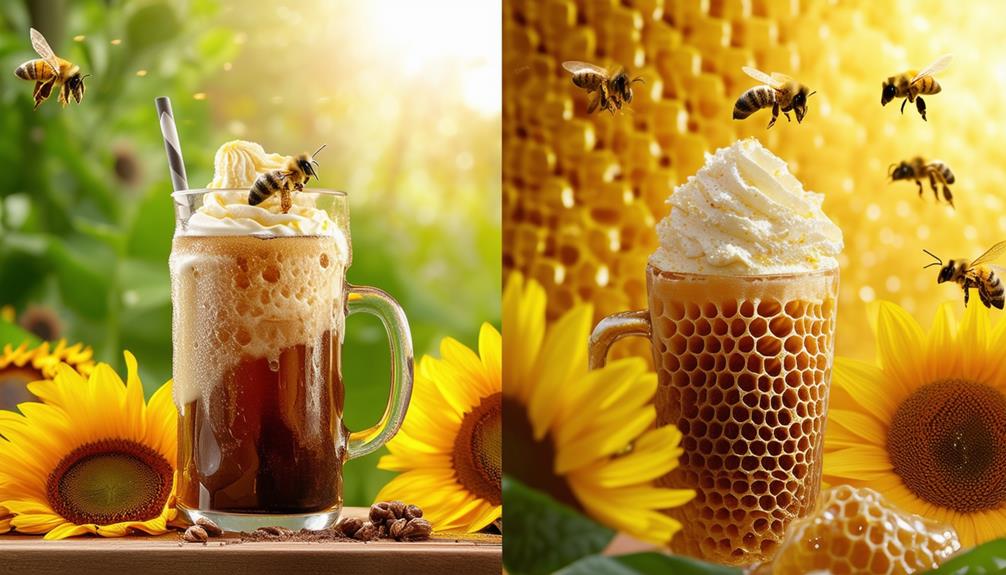As you reach for that frosty mug of root beer, you might wonder: is this classic drink really compatible with your vegan lifestyle? At a first glance, the traditional ingredients like sassafras and vanilla seem harmless. But, as you'll soon find out, some brands may be hiding animal-derived ingredients that could compromise your values. What secrets might be lurking in that creamy foam? Let's take a closer look at the unexpected twists and turns that'll make you rethink your root beer habits.
Root Beer's Vegan Roots
As you delve into the world of root beer, you'll discover that its vegan roots run deeper than you might anticipate, rooted in a history that's largely free from animal-derived ingredients. Root beer is typically made with plant-based ingredients like cane sugar, which makes it a great option for vegans.
In fact, many vegans enjoy root beer as a tasty, guilt-free treat. While some brands may use honey or dairy, many others offer vegan-friendly recipes that are free from animal products. When searching for a vegan root beer, be sure to check the ingredients list and contact the manufacturer to confirm its vegan status.
With a little investigation, you can find a delicious, cruelty-free root beer that fits your dietary preferences. So go ahead, grab a glass of vegan root beer and enjoy the sweet, bubbly taste, knowing you're supporting a more compassionate lifestyle.
Root Beer's Hidden Animal Derivatives
As you investigate the world of root beer, you might assume that the flavor profiles and core ingredients are straightforward, but that's not always the case.
You'll soon come across that some root beers have hidden animal derivatives lurking in their flavor profiles, and even in their core ingredients.
Root Beer Flavor Profiles
As you investigate the world of root beer, you'll notice that different brands boast unique flavor profiles. These profiles can be a blend of natural and artificial flavorings, which might raise some eyebrows if you're a vegan.
Let's break down the common flavor profiles you'll encounter:
- Sassafras flavor profile dominates, with a strong, earthy tone
- Wintergreen minty coolness adds a revitalizing twist
- Vanilla sweetness balances flavor, providing a smooth finish
- Some brands may incorporate other flavorings, like anise or licorice, to create a distinct taste
Sassafras Flavor Profile Dominates
You'll often find that sassafras flavor takes center stage in traditional root beer recipes, but what you mightn't know is that this dominant flavor profile can sometimes mask hidden animal derivatives.
Make sure to check labels carefully, as some root beers may be processed using animal by-products or dairy products, making them non-vegan.
Wintergreen Minty Freshness Added
Wintergreen oil, a common ingredient in root beer, injects a invigorating minty flavor that complements the dominant sassafras taste, but its presence can also raise questions about potential animal-derived additives.
You might wonder if wintergreen oil is vegan-friendly. While it's derived from plants, some brands might use animal-derived products in their wintergreen oil extraction process, making it crucial to check the label.
Vanilla Sweetness Balances Flavor
While sassafras and wintergreen take center stage in root beer's flavor profile, vanilla sweetness plays a vital supporting role, balancing the bitter and minty notes with a subtle creaminess that rounds out the drink's complex flavor experience.
You mightn't think twice about vanilla, but it's pivotal in harmonizing the flavors.
Root Beer's Core Ingredients
As you investigate the world of root beer, you'll notice that its core ingredients can vary greatly between brands. While some may be vegan-friendly, others might hide animal-derived ingredients.
To get to the root of the matter, let's examine the key components that make up this classic beverage:
- Sarsaparilla Root Extract Powder
- Yellow Birch Bark Extract
- Ginger Root Extract Powder
- Other plant-based ingredients that contribute to root beer's unique flavor.
Sarsaparilla Root Extract Powder
You might be surprised to learn that sarsaparilla root extract powder, a key component of root beer flavoring, is entirely plant-based. Derived from the roots of the sarsaparilla plant, this powder adds a unique earthy and slightly sweet taste to root beer.
As a plant-based ingredient, it makes root beer suitable for vegans, contributing to its classic flavor profile.
Yellow Birch Bark Extract
However, not all root beer ingredients are as vegan-friendly as sarsaparilla root extract powder, and yellow birch bark extract, a common component in traditional root beer recipes, is a prime example. This extract can contain salicylates, which may be derived from animal sources, making it non-vegan.
| Potential Issue | Vegan Impact |
|---|---|
| Salicylates from animal sources | Non-vegan |
| Unclear sourcing | Uncertainty for vegans |
| Plant-based sourcing | Vegan-friendly |
| Lack of labeling | Difficulty for vegans |
| Vegan certification | Reassurance for vegans |
Ginger Root Extract Powder
Ginger root extract powder, a common component in root beer, adds a spicy and aromatic flavor profile. Its vegan status depends on the absence of hidden animal derivatives. You should carefully examine the ingredients list to make sure it doesn't contain honey or animal-derived additives.
As a vegan, it's important to scrutinize the label to make informed choices.
Honey in Root Beer

Now that we've investigated the role of honey in root beer, you might be wondering what other ingredients could make your favorite brew non-vegan. Let's take a closer look at two more culprits: carmine-based red food dye and glycerin.
As you examine the ingredient list, keep an eye out for these hidden animal-derived products that could make your root beer unsuitable for a vegan diet.
Carmine-based Red Food Dye
As you venture into the world of root beer, you'll want to keep an eye out for some sneaky non-vegan ingredients. Besides honey, there are other potential offenders lurking in the shadows.
Let's take a closer look at some of these culprits.
- Gelatin-Based Foam Stabilizer: derived from animal bones and connective tissue, this additive helps maintain the frothy head on your root beer
- L-Cysteine-Based Clarifying Agent: often obtained from human hair or duck feathers, this amino acid is used to remove impurities from the brew
- Beeswax-Based Emulsifier Additive: another bee-derived ingredient, this wax helps blend ingredients together seamlessly
- Carmine-based Red Food Dye: as we discussed earlier, this vibrant red colorant is extracted from crushed insects, making it a definite no-go for vegans
Gelatin-Based Foam Stabilizer
You might assume that root beer is just a harmless blend of herbs and spices, but some manufacturers use gelatin-based foam stabilizers to give their brew a creamy head, making it off-limits to vegans.
This means that even if the ingredients list looks vegan-friendly, the foam stabilizer can render it non-vegan.
L-Cysteine-Based Clarifying Agent
Some root beer manufacturers use L-Cysteine, a clarifying agent derived from duck feathers or human hair, to remove impurities and improve the beverage's appearance.
You might be surprised to learn that this ingredient comes from such unusual sources.
As a vegan, it's crucial to check the label for L-Cysteine, as it's an animal-derived ingredient.
Beeswax-Based Emulsifier Additive
Beeswax, a common additive in root beer, serves as an emulsifier, stabilizer, and foaming agent.
Its origins from bees make it a non-vegan ingredient.
You might be surprised to find that beeswax is used to improve the texture and appearance of root beer.
Unfortunately, this means that root beers containing beeswax are off-limits to vegans.
Glycerin in Root Beer
As you investigate the ingredients in root beer, you'll want to keep an eye out for glycerin and honey, which can be derived from animal sources. These ingredients can make a seemingly vegan-friendly drink non-vegan.
Let's take a closer look at some other potential non-vegan ingredients to watch out for:
- Castoreum-derived natural flavoring
- Isinglass fining agent used
- Confectioner's glaze coating agent
- Carmine-coated bottle liners used
Castoreum-derived Natural Flavoring
When you crack open a cold root beer, you mightn't suspect that the creamy, sweet flavor could be thanks to a surprising ingredient: castoreum, a secretion from beavers that's sometimes used to improve flavors.
As a vegan, you should be mindful that castoreum isn't vegan-friendly, so it's important to check the ingredients list to make sure the root beer is free from animal-derived additives.
Isinglass Fining Agent Used
You might be relieved to know that isinglass, a fining agent derived from fish bladders, isn't typically used in root beer production. This means you don't have to worry about fish products in your root beer.
However, you should still check the ingredients for honey, which some brands use as a sweetener.
Confectioner's Glaze Coating Agent
Root beer brands that use confectioner's glaze, a common coating agent, may unknowingly incorporate non-vegan ingredients like shellac, which is derived from insects.
You'll want to check the label, as honey is another common non-vegan ingredient found in some root beers.
Glycerin, a common ingredient, can also be derived from animal sources, affecting its vegan status.
Carmine-Coated Bottle Liners Used
Manufacturers may unintentionally introduce non-vegan elements into their root beer products by using carmine-coated bottle liners, which are derived from crushed cochineal insects.
You mightn't think to verify the bottle liner, but it's crucial to confirm the entire product aligns with your vegan lifestyle.
Always check the ingredients and contact the manufacturer if you're unsure.
Root Beer's Vegan Future Uncertain
As the demand for plant-based products continues to surge, the fate of root beer's vegan status hangs in the balance, leaving many to wonder what the future holds.
You might be thinking, 'What's the big deal? Root beer is just a sweet, creamy drink, right?' Well, not exactly. Take Not Your Fathers Root Beer, for instance. Despite having mostly vegan-friendly ingredients, it's actually non-vegan due to the use of honey in its brewing process. The company behind it, Small Town Brewery, has confirmed this through email communication. This might come as a surprise, especially since honey is often overlooked as an animal-derived ingredient.
So, what does this mean for you, the consumer? If you're vegan, it's time to investigate alternative brands that don't contain animal-derived ingredients. The good news is that there are plenty of options out there.
The fate of root beer's vegan status might be uncertain, but one thing is clear: it's up to you to make informed choices about what you drink.
Conclusion
So, can you enjoy root beer as a vegan? Yes, you can – but with caution. Opt for brands that explicitly state they're vegan or try making your own at home.
Remember, some root beers may contain hidden animal-derived ingredients like honey or gelatin. By being mindful of the ingredients, you can savor this classic drink while staying true to your vegan beliefs.
